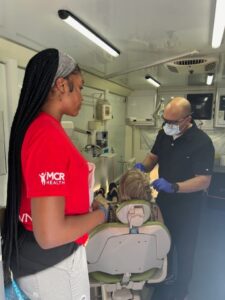Across the state, millions rely on Obamacare and Medicaid. Patients — and hospitals — are likely to struggle.
By Reece Helmick
Original Air Date: July 16, 2025
Host: The federal budget bill signed July 4 by President Donald Trump shrinks Medicaid enrollment and cuts Obamacare subsidies. That means hundreds of thousands of Floridians stand to lose health insurance. Reece Helmick reports.

The outlook is uncertain for low-income patients who rely on Medicaid-funded organizations like MCR Health.
Holly Bullard: Florida has more people on Obamacare than anywhere else in the nation, by far.
Reece Helmick: That was Holly Bullard, Florida Policy Institute’s chief strategy and development officer. Bullard believes Floridians who depend on Medicaid and AHCA—otherwise known as Obamacare—will suffer significant damage. Millions stand to lose their healthcare coverage due to government defunding. Florida is heavily dependent on government-supplied healthcare like Obamacare and Medicaid, Bullard says.
HB: We have 4.7 million people who get coverage through the marketplace exchange and get credits through our tax system to support that subsidies. That’s way more than any other state. That’s not even per capita. That’s just absolute numbers.
RH: Bullard points out that this is a reversal. Former President Joe Biden’s American Rescue Act increased subsidies for people who get their healthcare through the marketplace, so insurance premiums dropped nationwide, especially in Florida.
Trump’s budget bill also adds work requirements and proof of legal residency to Medicaid enrollment, amounting to trillion-dollar cuts. Over 400,000 individuals in Florida may become uninsured due to the work requirements.
A decline in the number of insured patients means hospitals across Florida will be struggling as well. Mary Mayhew is the president and CEO of the Florida Hospitals Association, and she told WSLR that she is concerned about the cuts to Medicaid.
 Florida hospitals have already been struggling with rising labor costs as well as inflation of the costs of supplies and pharmaceuticals. Low insurance reimbursement rates—including from Medicaid—have also been a challenge. Claim denial and low reimbursement by insurance companies are leading contributors to financial strain in medical care facilities, Mayhew says.
Florida hospitals have already been struggling with rising labor costs as well as inflation of the costs of supplies and pharmaceuticals. Low insurance reimbursement rates—including from Medicaid—have also been a challenge. Claim denial and low reimbursement by insurance companies are leading contributors to financial strain in medical care facilities, Mayhew says.
Mary Mayhew: Challenges with the insurance companies that administer Medicaid—insurance companies like United and Humana that administer Medicare—those insurance companies are often denying claims, holding onto claims claims and not paying. Hospitals are owed significantly for healthcare services that have been provided that insurance companies haven’t paid for.
RH: As the number of insured patients is declining, hospitals are under financial strain because they are employing primary care physicians, obstetricians, family physicians and pediatricians to preserve access to healthcare for a growing number of Floridians. Those physician practices have high volumes of Medicare and Medicaid patients, and those forms of health insurance don’t come close to covering the costs of services.
MM: These community-based physician practices that hospitals are often supporting in order to keep them in the community so that people don’t have to travel farther distances to go to an obstetrician, to a pediatrician, to a family physician.
 Medicaid pays for 45% of all births in Florida and doesn’t cover half the cost of birthing services, Mayhew says.
Medicaid pays for 45% of all births in Florida and doesn’t cover half the cost of birthing services, Mayhew says.
MM: It pays $0.48 on the dollar of cost. It doesn’t come anywhere near covering the cost of those births. We’ve had labor and delivery units in Florida close.
RH: In the meantime, the Florida congressional delegation helped give Florida hospitals a break by improving programs like the Directed Payments Program and the Associated Provider Tax that increase reimbursements from Medicaid. The increased reimbursements help preserve labor and delivery care. These programs also help support and preserve other necessities in hospitals, like inpatient psychiatric units and trauma centers.
Reece Helmick, reporting for WSLR News.
WSLR News aims to keep the local community informed with our 1/2 hour local news show, quarterly newspaper and social media feeds. The local news broadcast airs on Wednesdays and Fridays at 6pm.